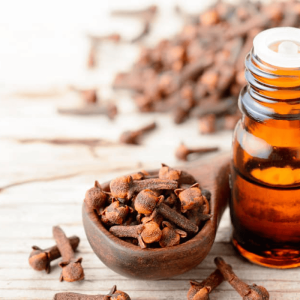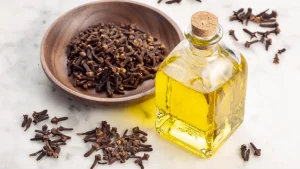
Clove oil for pain relief. A powerful and adaptable natural medicine, clove oil can be particularly helpful for dental health. The oil has a number of medicinal advantages, whether you’re seeking for a natural solution to freshen your breath or are coping with a toothache or gum irritation. To prevent irritation or negative effects, it should be used carefully and diluted appropriately due to its potency. As with any natural therapy, it’s crucial to speak with a healthcare provider for an accurate diagnosis and course of treatment if you have ongoing symptoms or health issues.
CLOVE OIL FOR PAIN RELIEF
Eugenol, a natural anesthetic that numbs the area and lowers inflammation and bacteria, is the active ingredient in clove oil, which is used diluted on a cotton ball for topical application. However, it should be used carefully, avoided by pregnant women, children, and those taking blood thinners, and always followed up with a dental visit.
Benefits of Clove Oil;

1. Pain Relief:
The most well-known use of clove oil is for relieving toothache pain. The active compound in the oil, eugenol, acts as a natural anesthetic, numbing the affected area and providing temporary relief from pain. This makes the oil a popular home remedy for toothaches, sore gums, and mouth ulcers.
2. Antibacterial Properties:
Clove oil has strong antibacterial effects that can help combat infections in the mouth. It can inhibit the growth of bacteria that cause dental issues, such as cavities and gum disease. Using the oil can support overall oral hygiene and help prevent oral infections.
3. Anti-Inflammatory Effects:

In addition to pain relief, clove oil’s anti-inflammatory properties can help reduce swelling and irritation in the gums. This is particularly useful for conditions like gingivitis or inflamed gums due to a toothache.
4. Digestive Aid:
the oil is also used to alleviate digestive issues like bloating, indigestion, and nausea. When diluted and consumed properly, it can help soothe the stomach and support digestion.
How to Use Clove Oil;
– For Toothaches:

clove oil for pain relief
Dip a cotton ball or swab into a few drops of the oil and apply it directly to the painful tooth or gums. Let it sit for about 15-20 minutes, then rinse your mouth with warm water. Be careful not to swallow clove oil, as it can be strong and cause irritation.
– For Gum Health:
Mix a few drops of the oil with a carrier oil, such as coconut or olive oil, and gently massage it into your gums. This can help reduce inflammation and keep your gums healthy.
– As a Mouthwash:
Add 2-3 drops of the oil to a cup of warm water and use it as a mouthwash. This can help freshen your breath, kill bacteria, and soothe minor mouth irritations.
Safety Considerations;

clove oil for pain relief
While the oil is a powerful natural remedy, it’s important to use it with caution:
– Dilution:
the oil is highly concentrated and should always be diluted with a carrier oil (such as coconut or olive oil) before applying it to the skin or gums.
– Sensitivity:
Some people may be sensitive to the oil, especially when used in high concentrations. It’s advisable to perform a patch test on a small area of skin before using it more broadly. If you experience any irritation or discomfort, discontinue use.
– Ingestion:

clove oil for pain relief
While the oil can be used for oral health. It should not be swallowed in large amounts as it can cause stomach upset, respiratory issues, or other adverse effects. Always use it in moderation and consult a healthcare professional before ingesting clove oil, especially if you have underlying health conditions or are pregnant.
Summary
The dried flower buds of the clove tree are used to make clove oil, a potent essential oil. Clove oil has been used for generations in traditional medicine, especially for oral health, due to its strong analgesic, anti-inflammatory, and antibacterial qualities. Here’s a closer look at the health benefits and safe usage of clove oil.